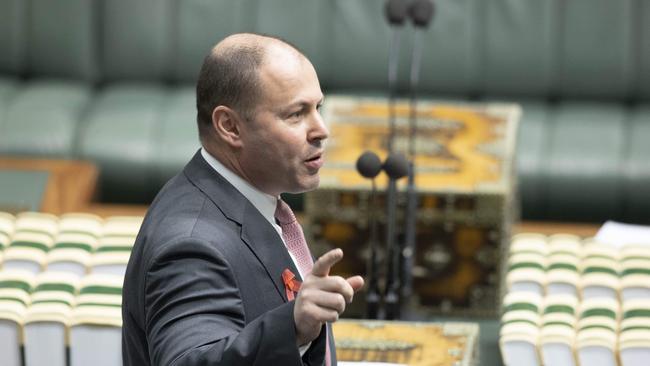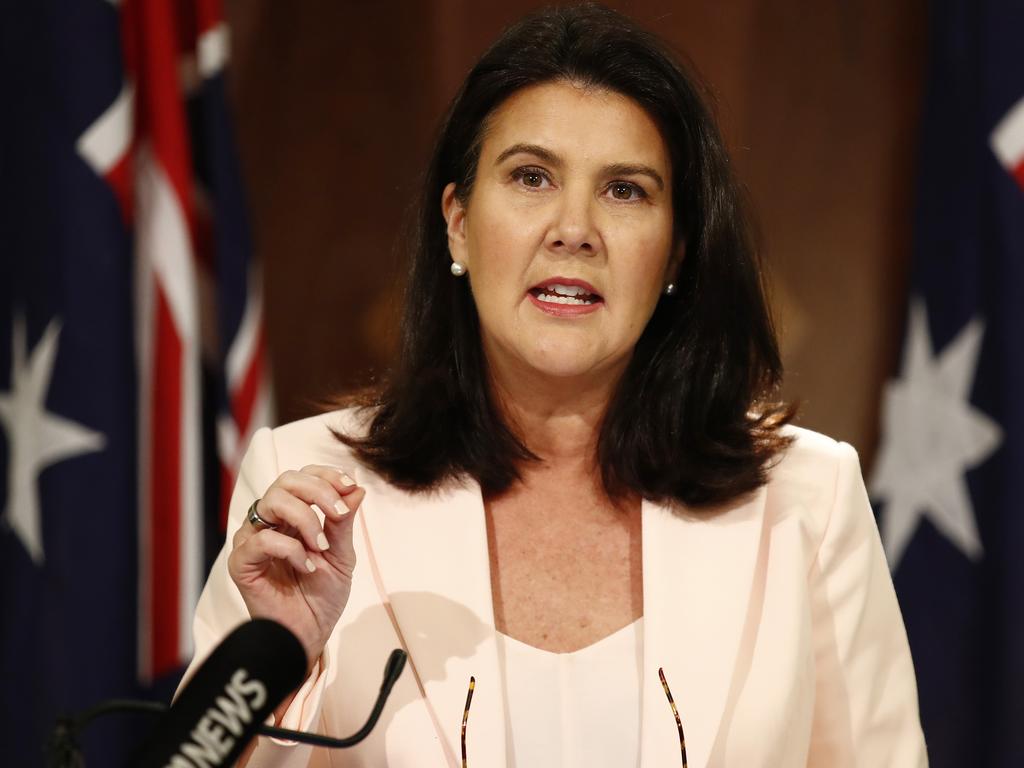
This month the ASX 200 index has increased a stunning 800 points, or 13 per cent, marking the best November in recent memory and following Wall Street’s best November for 33 years.
The S&P 500 index is up 12.5 per cent for the year, but Australia is lagging because it doesn’t have the COVID stocks that are driving the US.
These include healthcare and drugmakers buoyed by the hope of imminent vaccines and Big Tech, which is booming on the fast-forward switch to digitisation.
The strong message from the Reserve Bank is that rates will be lower for longer, with a pick-up in jobs now the key indicator for the central bank, not asset prices.
Liquidity is a key driver of the market’s move, with money flooding into US stock funds.
The debt binge continued with the Victorian state budget on Tuesday. In its latest global forecasts, CSFB said Australia “has proved relatively resilient among developed nations. We expect GDP to recover by 5 per cent in 2021 after a fall of 6 per cent in 2020.
“The official cash rate is likely to stay anchored at the current 0.1 per cent. Australia is benefiting from a resilient trading partner in China, and strong agricultural production is expected with the breaking of the drought.”
That, of course, assumes China is the investment partner promised because the latest briefings from BHP suggest coal exports are still subject to delays, adding to the concerns over the trade relations.
Credit Suisse’s chief investment officer Australia Andrew McAuley said: “Australia is set to recover most of the GDP lost in 2020 in 2021, but not all.
“COVID-19 has been contained, but it will take some time for overseas tourists and international students to return to Australia.
“Even so, the federal and state governments and the RBA have shown a determination to ensure the national economy stays on a recovery track.”
Michael Strobaek, global chief investment officer at Credit Suisse, said: “We believe that the stimulus measures we have seen since the start of the pandemic together with the economic recovery will support financial assets, equities in particular, in the year ahead.
“But there are risks that still need to be monitored carefully. To preserve wealth and meet long-term obligations, investors should invest in well-diversified multi-asset strategies with a significant share of portfolios invested in equities.”
MST strategist Hasan Tevfik maps the market value at a 10-year average earnings per share and on that basis it is trading at a price-earnings multiple of 19.5 times against an average of 21 times.
This suggests the market is cheap and to get to the long-term average should be trading above 7000 points, against the 6700 mark hit on Wednesday.
The Australian market is dominated by the big banks, which in the wake of a better economy and reviewed APRA rules could be trading at higher levels with better dividends expected.
Some hints of a semblance of normality in politics has boosted US stocks, along with news that Janet Yellen will be the Treasury secretary. She is highly regarded on both sides of the house and as a former Fed boss well versed on both fiscal and monetary policy.
Insolvency holidays
The reported sighting of Mark Korda and other insolvency heavyweights on the golf course of late shows business is not great, with corporate undertakers potential clients to their brethren.
The reason is the bounce in the Australian economy, which is now tipped to run past the March wind-down of JobKeeper et al thanks to $49bn in spending from the Victorian government among others and record low interest rates for the next four years.
Josh Frydenberg is still to decide whether to extend the relaxation of insolvency rules past the proposed December deadline, which could trigger concerns if the Treasurer doesn’t extend as expected until the end March.
Safe-harbour protection is granted only to companies that file for administration or liquidation prior to the end of December.
The debate is over how the courts may interpret the provisions, with some giving the bench the benefit of reasonable doubt in view of the safe harbour circumstances.
The idea was to give boards some leeway to allow them to trade out of temporary cashflow shortages, without worrying about insolvent trading restrictions.
Still, all eyes are on the Treasurer, who by maintaining the December cut-off will ironically be backing the benefits of his own support package.
Far better to return to normal operations as soon as possible, but if you are an undertaker looking for work that show of faith doesn’t pay the bills. Small business concessions remain, giving them debtors in possession rights for debts of less than $2m with the support of half their unsecured creditors and, with banks and landlords often secured, the remaining wildcard is the tax office.
Roughly half the nation’s 2.2 million small businesses don’t make it past year five, often for lifestyle reasons, but this year’s pandemic has wreaked havoc and some Deloitte figures show 240,000 could go under.
When the corporate undertaker was called in, the common response was simply to sell the assets and move, but this time, according to COSBOA’s Peter Strong, the business owner will have some say in his or her future.
Outside lifestyle reasons, the cause of small business failures include 51 per cent at poor cash management, 43 per cent poor strategic management and 40 per cent trading losses.
ACCC busy in court
The week of December 7 will be a busy one for the ACCC in court cases, starting with the Tuesday decision on whether to refer the ANZ cartel case to the Federal Court.
The case is a landmark ruling for financial markets and the handling of equity raisings.
The case is against high-profile bankers from ANZ, Citicorp and Deutsche Bank.
A sentencing hearing is also due for former BlueScope executive Jason Ellis, who pleaded guilty to attempting to obstruct officials in the course of their duty.
The full examination of the ACCC case over Ellis’s alleged threats of dumping action to affect competition is due to be heard next year.
The High Court is also due to decide whether it will hear the ACCC’s appeal against the Federal Court’s ruling on the PN-Aurizon case.
The ACCC said the court didn’t consider the full impact of the merger on competition.
It noted: “A lack of competition in rail freight would likely lead to increased prices, for businesses and consumers around the country.”
The court cleared the merger after accepting a late behavioural undertaking.
Zero emissions push
The business push on climate change took another step on Wednesday with the Climate Leaders Coalition created to co-ordinate measures towards zero emissions.
An initiative of Richard Branson’s B team includes BHP, Mirvac, AGL, Wesfarmers, Viva, Rio Tinto, Santos, Worley, Incitec Pivot and Fortescue.
The move is one more example of business showing more leadership than the government on climate change.







“Don’t ask why, just buy” is the mantra governing stockmarkets, helping to propel global equities to new highs and helping the Australian market near break-even for the year.